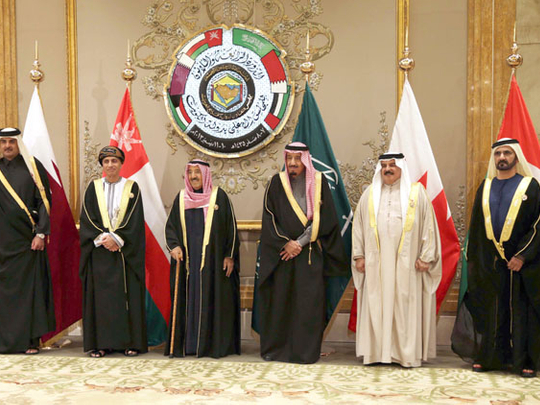
Kuwait City: Kuwait’s Emir Shaikh Sabah Al Ahmad Al Sabah opened an annual Gulf summit on Tuesday with a call for an end to the “human catastrophe” in Syria.
He issued the plea as Ahmad Jarba, leader of Syria’s main oposition National Coalition, attended the opening of the summit and delivered a speech in which he appealed for urgent help from the Gulf states.
“The human catastrophe is still ongoing in Syria which calls on us to double efforts and work with the international community, especially the UN Security Council which has remained unable to put an end to this human tragedy,” Shaikh Sabah said.
The leaders of the Gulf Cooperation Council (GCC) states are due to discuss during the two-day summit a range of issues including the situation in Syria, ties with Iran and boosting economic cooperation between their member states.
Ties between GCC states and neighbouring Iran have come under the spotlight after a landmark deal was reached last month between Tehran and world powers over its disputed nuclear programme.
Iran’s Foreign Minister Mohammad Javad Zarif last week toured four GCC countries, but not Saudi Arabia or Bahrain.
Zarif tried to assure Gulf states the nuclear deal was not at their expense and called for a new page in relations, although Saudi Arabia in particular appears to remain sceptical.
In his speech, Shaikh Sabah said the Gulf states had “expressed their satisfaction with the interim Geneva deal... hoping it would succeed and lead to an everlasting agreement that would keep tension away from the region”.
This year’s summit is being staged amid differences over a Saudi proposal to upgrade the GCC into a confederation, a move Oman has publicly rejected.
Omani Foreign Minister Yousuf Bin Alawi threatened at the weekend that Muscat would pull out of the loose alliance if a union was announced, while Saudi Arabia, solidly backed by Bahrain, insisted it was time to move ahead.
Kuwait’s State Minister for Cabinet Affairs Shaikh Mohammad Abdullah Al Sabah told reporters talks over the union were still ongoing.
“When consensus is reached, a special summit will convene in Riyadh to make the announcement,” he said, ruling out a major declaration at the Kuwait meeting.
Details on the confederation proposed by Saudi King Abdullah in 2011 have not been disclosed.
“Oman does not want to be a part of any measure that might be seen as directed against Iran,” Emirati political analyst Abdulkhaleq Abdullah told AFP.
Muscat enjoys good relations with Tehran and might be distancing itself from a union led by heavyweight Saudi Arabia, which sees Tehran as a regional rival.
Kuwait’s foreign ministry undersecretary Khalid Al Jarallah told the official KUNA news agency on Tuesday that the summit would approve setting up a unified GCC military command.











